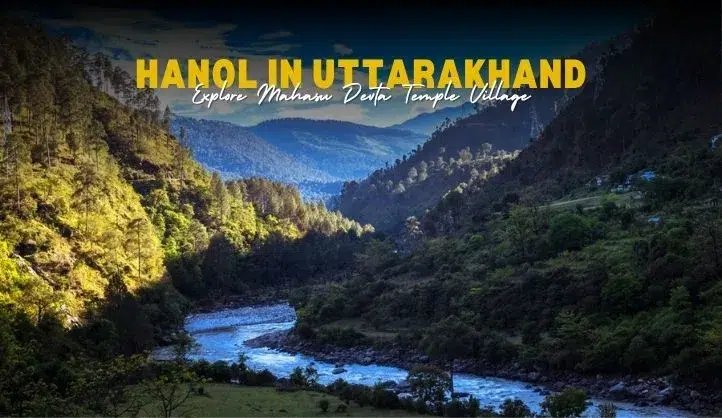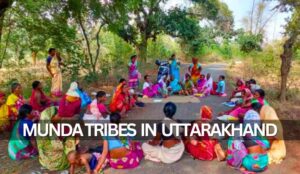Imagine a place where you wake up to the sound of birds, the cool breeze brushes your face, and the holy river flows beside an ancient temple. That place is Hanol, a tiny but magical village in Uttarakhand, located in the Jaunsar-Bawar region of Dehradun district.
Away from the noise of cities, Hanol gives you a chance to experience natural beauty, religious peace, and local culture — all in one trip.
Though it is not as popular as places like Mussoorie or Rishikesh, Hanol is gaining attention for its mystical Mahasu Devta Temple, scenic surroundings, and quiet charm. This blog will guide you through everything you need to know about the village – what to see, how to reach, when to go, and why it should be on your travel bucket list.
Where is Hanol Located?
Hanol village is located in the Chakrata region of Uttarakhand, very close to the border of Himachal Pradesh. It sits beautifully on the banks of the Tons River, surrounded by thick deodar and pine forests. This region falls in the Jaunsar-Bawar tribal belt, known for its ancient customs, traditional wooden houses, and untouched nature.
Quick Location Facts:
-
State: Uttarakhand
-
District: Dehradun
-
Region: Jaunsar-Bawar
-
Altitude: Around 1,050 meters above sea level
-
Nearest Towns: Chakrata (78 km), Tiuni (25 km), Mori (43 km)
-
Distance from Dehradun: ~180 km
-
Distance from Mussoorie: ~120 km
Map for Mahasu Devta Temple
Mahasu Devta Temple – The Spiritual Heart of Hanol
The most important attraction in Hanol is the Mahasu Devta Temple, which is not only a holy place but also a living piece of history and architecture.
This ancient temple is dedicated to Mahasu Devta, the chief deity of the Jaunsar-Bawar region. The temple is believed to be over 500 to 900 years old, built in the unique Kath-Kuni architecture, using wood and stone without any nails.
Who is Mahasu Devta?
According to legend, Mahasu Devta and his three brothers came from Kashmir to help the people of this region who were suffering under the rule of a cruel demon called Kirmir Asura. After defeating the demon, Mahasu Devta stayed in Hanol to protect the villagers. Since then, he has been worshipped here with deep devotion.
The deity is so powerful that people from nearby villages and even faraway states like Himachal Pradesh come here to pray, solve personal issues, and seek justice.
Temple Highlights:
-
Built in Kath-Kuni style: no nails used, earthquake-resistant.
-
Intricate wooden carvings on doors, beams, and windows.
-
Devotees offer goats, grains, and wool to Mahasu Devta.
-
The temple has its own priests and caretakers, who follow ancient rituals.
-
Entry inside the inner sanctum is restricted only to the priest.
-
Mahasu Devta Fair is celebrated every year in August.
Things to Do There
Even though this village is small, there’s a lot to explore and experience. Here are some things you can enjoy during your visit:
Visit the Mahasu Devta Temple
Spend time at this sacred site, talk to the priests, and feel the peaceful aura of this old temple. It’s the spiritual center of the region.
Riverside Walk Along the Tons River
The Tons River, a tributary of the Yamuna, flows right next to the village. You can:
-
Sit quietly and enjoy the flowing water.
-
Go for a nature walk or picnic.
-
Try angling or fishing in the summer months.
Explore the Forests and Wildlife
The dense deodar forests around the village are home to various birds and animals like:
-
Barking deer
-
Langurs
-
Leopards (rare)
-
Himalayan birds
This is a great spot for birdwatchers and wildlife lovers.
Short Treks and Village Walks
You can take short hikes to nearby villages or forest trails. Popular nearby trekking options:
-
Kharamba Peak (2–3 hours trek) – offers a beautiful panoramic view.
-
Chakrata Trek – longer treks can be arranged from Hanol to Chakrata.
-
Visit Tuini, a market town near Hanol for local items.
Meet the Jaunsari Tribes and Taste Local Food
Interact with the Jaunsari people, known for their warm hospitality, unique dress, and folk traditions. You can also try:
-
Mandua Roti (finger millet bread)
-
Red rice with ghee
-
Local saag (greens) and dal
-
Siddu (steamed stuffed bread)
How to Reach Hanol
Though remote, Hanol is accessible through road, and the journey itself is scenic and adventurous.
By Road:
-
From Dehradun – 180 km (via Chakrata or Mussoorie–Tiuni route)
-
From Mussoorie – 120 km (via Yamuna Bridge and Tiuni)
Regular buses and shared jeeps are available from Dehradun to Tiuni. From Tiuni, hire a local taxi to reach Hanol.
By Train:
-
Nearest Railway Station: Dehradun (180 km)
-
From the station, take a bus or hire a cab.
By Air:
-
Nearest Airport: Jolly Grant Airport, Dehradun
-
From the airport, travel via road to the village.
Where to Stay in Hanol
Accommodation there is basic but comfortable.
Options:
-
GMVN Tourist Rest House – run by the government
-
Local Homestays – clean and simple, offers local food
-
Lodges and Guest Houses – available in Mori and Tiuni
For a true experience, stay in a homestay to enjoy local hospitality and culture.
Best Time to Visit
Hanol can be visited throughout the year, but summer and autumn are the most comfortable times.
| Season | Details |
|---|---|
| Summer (April – June) | Cool weather, ideal for sightseeing and treks |
| Monsoon (July – Sept) | Lush greenery but risky roads |
| Autumn (Oct – Nov) | Pleasant weather and festive vibes |
| Winter (Dec – Mar) | Very cold, some snowfall, fewer tourists |
Places to Visit
the village is surrounded by offbeat destinations you can explore easily in a day trip.
| Place | Distance | Highlights |
|---|---|---|
| Chakrata | 78 km | Tiger Falls, Budher Caves, hill views |
| Mori | 43 km | Peaceful camping by the Tons River |
| Tiuni | 25 km | Market town, confluence of rivers |
| Lakhamandal | 100 km | Ancient temple linked to Mahabharata |
| Kharamba Peak | 10 km trek | Scenic mountain views and camping |
| Purola | 80 km | Hill town, gateway to Har Ki Dun Valley |
| Saru Tal Trek | 90 km | High-altitude trek in remote Himalayan region |
Culture of Hanol and Jaunsar-Bawar
The region is part of Jaunsar-Bawar, known for its:
-
Tribal customs
-
Wooden houses with stone roofs
-
Unique marriage rituals
-
Ancient oral traditions
-
Festivals like Mahasu Devta Fair, Magh Mela
Locals wear traditional woolen clothes, and their language is Jaunsari. The culture here is different from other parts of Uttarakhand and reflects a mix of Himalayan and Tibetan influences.
Food and Local Dishes in Hanol
Most food in Hanol is home-cooked and organic.
Must-Try Dishes:
-
Mandua Roti – healthy finger millet bread
-
Bhatt ki Dal – made from black soybeans
-
Red rice – grown locally in terraced fields
-
Gahat (Kulthi) soup
-
Siddu – stuffed steamed wheat flour bread
-
Chhaas (Buttermilk) – cooling drink in summers
You’ll find simple meals cooked on mud stoves, served with love.
Travel Tips for Visitors
-
No ATMs – Carry enough cash
-
Poor Mobile Network – BSNL works occasionally
-
Avoid plastic – Respect the environment
-
Respect traditions – No photography inside temple
-
Travel in daylight – Roads are narrow and hilly
-
Carry warm clothes – Even in summer, nights can be cold
Conclusion
If you’re looking for a place untouched by modern crowds, a place where gods are worshipped with love, and nature still rules the land, then Hanol is your perfect getaway.
Whether you’re a spiritual seeker, a nature lover, or just someone tired of touristy places — Hanol in Uttarakhand will give you peace, stories, and memories that stay forever.
So next time you think of visiting the hills, skip the usual spots and head to this sacred, scenic village. Hanol is waiting for you.
FAQs about Hanol
1. Why is Hanol famous?
Hanol is famous for the Mahasu Devta Temple, its peaceful surroundings, and local culture.
2. Is Hanol safe for solo travel?
Yes, it is a very safe and friendly place, especially for those seeking peace and nature.
3. How many days are needed to explore Hanol?
2 to 3 days are enough to explore Hanol and nearby areas.
4. Are there any ATMs or petrol pumps nearby?
No ATMs in Hanol. The nearest petrol pump is in Tiuni (25 km).
5. Is there snowfall in Hanol?
Yes, Hanol receives snowfall in December–January, but roads may be blocked during heavy snow.





